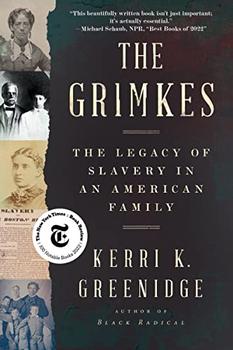Summary | Excerpt | Reviews | Beyond the Book | Readalikes | Genres & Themes | Author Bio

The Legacy of Slavery in an American Family
by Kerri K. GreenidgeINTRODUCTION
The Two Nanas
As a terrible heat wave spread across New England in July 1911, a federal express train snaked its way up the Atlantic coast on the New York, New Haven, and Hartford line. It left Union Station in Washington, DC, bound for Boston, where the heat was so oppressive that wilted citizens slept in the city's Common between Tremont and Beacon Streets and anxious mothers stayed up all night walking their infants up and down tenement sidewalks strewn with mattresses and pillows: they were afraid their babies would fall asleep, overheat, and not wake up with the sunrise.1 Temperatures in Hartford, Connecticut, were so high—in the nineties after midnight—that one man, driven mad by the sweat and unrelenting mugginess, scaled a utility pole until authorities prodded him down with brooms and sticks. 2
With the train barrelling toward Connecticut, over one hour behind schedule, Angelina Weld Grimke tried anything she could to keep cool in the Pullman car. She wore only a light kimono and slept bare on her mattress, arms dangling through the narrow window so that the breeze from the passing countryside could counteract the sweat pouring from every surface of her body. She had taken this trip from the District of Columbia to Boston countless times. Although she lived and taught in the District, she spent summers and most holidays gallivanting around the New England countryside, where she had spent most of her adolescence. She usually read or wrote letters to friends on the train, but the heat was so suffocating that she found herself unable to do anything more than look languidly out the window. 3
As the train approached Bridgeport, Connecticut, a loud crash and the sound of screeching brakes jolted her awake. People screamed and glass shattered, while her Pullman car jumped the track and lurched down a twenty-foot embankment. Twelve people died and forty-four were wounded. Angelina Weld Grimke was one of the luckier ones, even though her back was broken and her luggage lost: all of her clothes, money, and personal papers muddled with the rest of the debris at the bottom of the Bridgeport embankment. Her long recovery would begin at the local hospital. Some of the dead had been so badly mutilated that it took weeks for family members to identify their remains.
News of the train crash and Angelina's near death spread like wildfire through the "colored elite," the small yet influential class of Black people whose educations, family history, and relative economic stability tasked them with "developing the Best of this race that they may guide the Mass away from the contamination and death of the Worst." 4 Angelina, called Nana by everyone who knew her, was a favorite daughter of this elite, despite rumors of her madness and whispers of her "inappropriate relationships" with women. Her father, Archibald Henry Grimke, was a cofounder of the National Association for the Advancement of Colored People (NAACP), a graduate of Harvard Law School, an author and sometime newspaper editor, and a former American consul to Santo Domingo in the Dominican Republic. In this position, he had earned respect from his fellow "colored elite" at the expense of African-descended subjects living under American empire, but what he lacked in transnational Black solidarity, he made up for in wealth and education. With his nearly white skin, his Washington, DC, real estate investments, and his familiarity with some of New England's most renowned scholar-reformers—for example, women's rights author Lillie Buffum Chace Wyman and civil rights attorney Albert E. Pillsbury—Archibald, called Archie, had been a fixture in the colored elite for some time. He and his brother, the Washington Presbyterian minister, Francis James Grimke (called Frank), first arrived at the Boston offices of the New England Freedman's Aid Society in 1866.
Reprinted from The Grimkes: The Legacy of Slavery in an American Family by Kerri K. Greenidge. Copyright © 2022 by Kerri K. Greenidge. Used with permission of the publisher, Liveright Publishing Corporation, a division of W. W. Norton & Company, Inc. All rights reserved.
Your guide toexceptional books
BookBrowse seeks out and recommends the best in contemporary fiction and nonfiction—books that not only engage and entertain but also deepen our understanding of ourselves and the world around us.